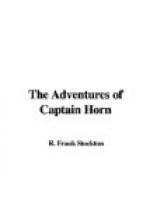His suspicions fell upon Ralph, chiefly because his most earnest desire at that moment was that Ralph might be the offender. If he could have believed that he would have been happy. It must have been that the boy was not willing to go away and leave all that gold, feeling that perhaps he and his sister might never possess any of it, and that just before leaving he had made a hurried visit to the mound. But the more the captain thought of this, the less probable it became. He was almost sure that Ralph could not have lifted that great mass of stone which formed the lid covering the opening of the mound, for it had required all his own strength to do it; and then, if anything of this sort had really happened, the letters he had received from Edna and the boy must have been most carefully written with the intention to deceive him.
[Illustration: Holding his lantern over the opening he gazed down into the mound.]
The letter from Edna, which in tone and style was a close imitation of his own to her, had been a strictly business communication. It told everything which happened after the arrival of the Mary Bartlett, and gave him no reason to suppose that any one could have had a chance to pillage the mound. Ralph’s letter had been even more definite. It was constructed like an official report, and when the captain had read it, he had thought that the boy had probably taken great pride in its preparation. It was as guardian of the treasure mound that Ralph wrote, and his remarks were almost entirely confined to this important trust.
He briefly reported to the captain that, since his departure, no one had been in the recess of the cave where the mound was situated, and he described in detail the plan by which he had established Edna behind the wall in the passage, so as to prevent any of the sailors from the ship from making explorations. He also stated that everything had been left in as high a condition of safety as it was possible to leave it, but that, if his sister had been willing, he would most certainly have remained behind, with the two negroes, until the captain’s return.
Much as he wished to think otherwise, Captain Horn could not prevail upon himself to believe that Ralph could have written such a letter after a dishonorable and reckless visit to the mound.
It was possible that one or both of the negroes had discovered the mound, but it was difficult to believe that they would have dared to venture into that awful cavern, even if the vigilance of Edna, Mrs. Cliff, and the boy had given them an opportunity, and Edna had written that the two men had always slept outside the caves, and had had no call to enter them. Furthermore, if Cheditafa had found the treasure, why should he keep it a secret? He would most probably have considered it an original discovery, and would have spoken of it to the others. Why should he be willing that they should all go away and leave so much wealth behind them? The chief danger, in case Cheditafa had found the treasure, was that he would talk about it in Mexico or the United States. But, in spite of the hazards to which such disclosures might expose his fortunes, the captain would have preferred that the black men should have been pilferers than that other men should have been discoverers. But who else could have discovered it? Who could have been there? Who could have gone away?




